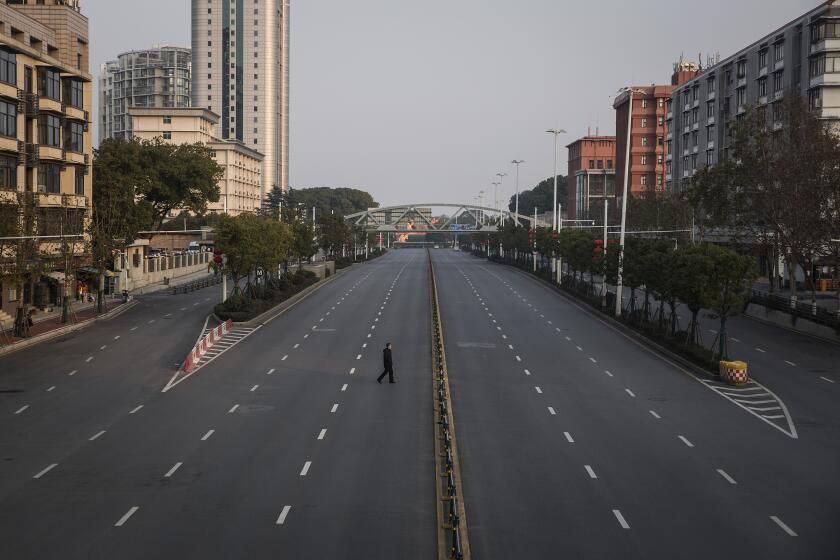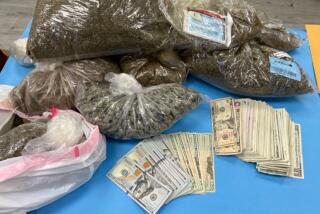Dirty money piling up in L.A. as coronavirus cripples international money laundering
Dirty money is piling up in Los Angeles. In the last three weeks, federal agents made three seizures that each netted more than $1 million in suspected drug proceeds.
The reason, according to the city’s top drug enforcement official: The coronavirus pandemic has slowed trade-based money laundering systems that drug trafficking groups use to repatriate profits and move Chinese capital into Southern California.
With storefronts closed, supply chains in disarray and the global economy in peril, these complex schemes are hobbled and cash is backing up in Los Angeles, Bill Bodner, special agent in charge of the Drug Enforcement Administration’s Los Angeles field division, said in an interview.
The recent million-dollar interceptions were reminiscent of seizures the DEA made before drug traffickers embraced trade-based money laundering, said Bodner, a 28-year agent.
The shuttering of nonessential businesses has made a “tremendous impact” on a money laundering system dubbed the black market peso exchange, he said. In the fashion district in downtown Los Angeles — the exchange’s epicenter — drug trafficking groups from throughout the country use wholesalers to remit profits to Mexico, according to cases filed in federal courts in Los Angeles and elsewhere.
Steven Mygrant, a federal prosecutor in Oregon who charged six people with laundering heroin proceeds through Los Angeles businesses, said two primary factors drive the exchange: Drug trafficking groups need to convert dollars to pesos, which is expensive to do legitimately, and they need to move money from the United States to Mexico, which is risky to transport in cash.
To accomplish this, Mygrant said, a broker pays pesos for the drug traffickers’ dollars. The traffickers deliver cash to an exporter in Los Angeles, who ships goods — commonly clothing, cosmetics, jewelry or sportswear — to a retailer in Mexico. The retailer sells the goods for pesos and pays the broker.
Developed by Colombian cocaine traffickers, Mexican cartels initially did not embrace the black market peso exchange, Bodner said, finding it easier to simply smuggle bulk cash across the border and launder it in Mexico. That changed about 10 years ago, he said, when the Mexican government tightened financial regulations and restricted the flow of dollars into its banks.
Rogelio Flores Guzman, a Mexican national with legal U.S. residency, was charged Friday with trafficking five types of drugs.
Recently, with storefronts closed and agents seizing millions in cash packaged for transport, it appears drug trafficking groups are resorting to older, riskier ways of repatriating profits, Bodner said.
The coronavirus has also cooled Chinese capital flight, he said, which before the pandemic was the primary driver of international money laundering.
Toward a more sustainable future
Sign up for Boiling Point, a newsletter exploring climate change and the environment, and become part of the conversation — and the solution.
You may occasionally receive promotional content from the Los Angeles Times.
With the Chinese government curtailing the amount of money its citizens can shift overseas, drug traffickers and money brokers set up the following system, Bodner said: A Chinese national who wants to convert yuan to dollars and stash it in the United States will contact a broker. The broker instructs this person to pay a factory that produces chemicals used to make methamphetamine or fentanyl.
The factory ships the precursors to Mexico, where they’re converted into narcotics, smuggled into the United States and sold for dollars. The broker directs the drug trafficking group to deliver cash to a relative or an associate of the Chinese national whose money initiated the entire sequence.
The money is now in the United States and in dollars, without ever entering the global financial system.“The more money that wants to leave China, the more chemicals go to Mexico and the more synthetic drugs end up in L.A.,” Bodner said.
The coronavirus pandemic has disrupted many industries, both legal and illicit. Production of fentanyl, which relies on chemical ingredients sourced mainly from Wuhan, China, has been particularly hard hit.
But the pandemic has slowed the cycle significantly, he said. Most narcotics precursors from China are made in Wuhan, the epicenter of the coronavirus outbreak, and factories there are shuttered or operating at a reduced capacity.
“When chemicals aren’t flowing from China, there’s no churn in the money laundering system,” Bodner said. Further, with global markets in upheaval, many of the Chinese nationals who were moving money through the system are now hesitant to stash funds overseas, he said.
Slowdowns in Los Angeles’ money laundering systems come as drug prices rise in the city. With supply chains in disarray, Bodner said, the wholesale price of methamphetamine has soared to about $1,800 a pound, compared with about $900 a pound five months ago.
More to Read
Sign up for Essential California
The most important California stories and recommendations in your inbox every morning.
You may occasionally receive promotional content from the Los Angeles Times.











